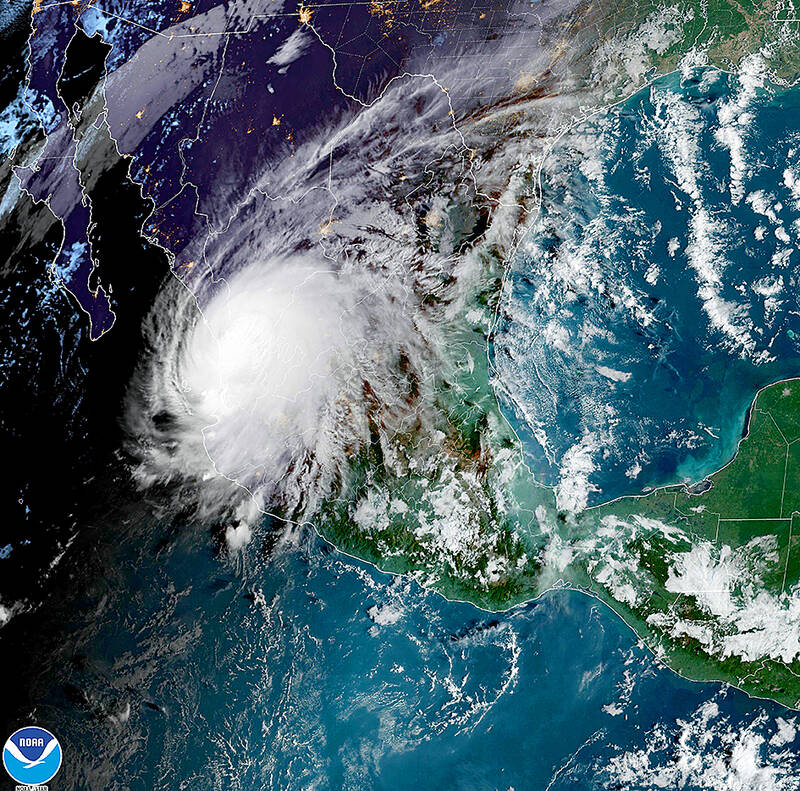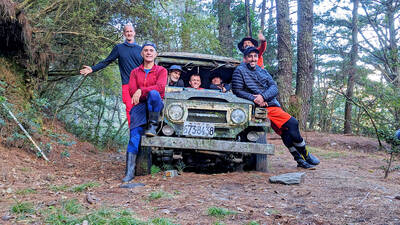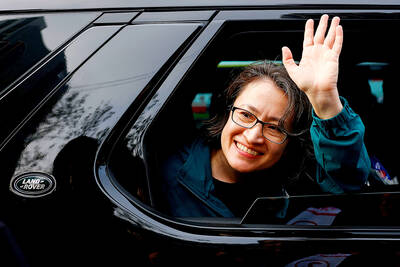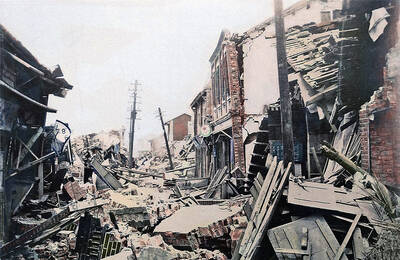It would no longer be “life as we know it” if a space war destroyed the satellites that the world now relies on, space commanders have warned, and China and Russia have demonstrated that they’re capable of doing just that.
Senior military leaders from the US and Canada are in Sydney for an Australian Strategic Policy Institute conference on space as the new frontier in “commerce, industry, competition and war.” They have discussed the importance of working with allies, including Australia, to counter the threats posed by space war.
Lieutenant General Nina Armagno, staff director of the US Space Force, said Russia’s destruction of one of their own satellites last year was a “stunning display.”

Photo: EPA-EFE
“We’re interpreting that … as a message and demonstration of capability,” she said.
Brigadier general Michael Adamson, commander at 3 Canadian Space Division (Canada’s space force), said on behalf of Canada: “No way … holy crap, this is a topsy turvy world, you can’t do that.”
“Same with us,” Armagno said.

Photo: AFP
She said China was openly documenting and describing its demonstrations of power in space. Asked what the end game could be, she said, “Life as we know it would no longer be as we know it.”
Attacks on satellites can take out GPS systems, banking systems, power grids, first responders’ communications, and impact on military operations, they said.
“What does war in space look like? We probably won’t see it with our naked eye but we will definitely feel the consequences from the moment it begins.”
She also described China’s 2007 destruction of one of its own satellites as shocking, irresponsible and intentional. The US was also concerned about an occasion last year where a Chinese satellite with a grappling arm moved another satellite out of orbit.
Adamson said Russia’s own space program was faltering, leaving it less reliant on space infrastructure. That in turn makes it more likely to “salt the Earth,” or destroy access to space, because it has “less to lose,” he said.
There are two ways attacks on satellites could take out communication networks. A direct attack — through anti-satellite missiles, grappling arms or hacking or jamming a satellite — is one. The other is the debris created by a destroyed satellite. Armagno said the US was still tracking 600 pieces of debris from China’s 2007 “demonstration.”
Even a tiny piece of debris could seriously damage spacecraft such as the International Space Station, which manoeuvres to avoid them. The Russian event created 1,500 pieces of debris, which threatened cosmonauts and astronauts on the ISS.
Armagno said the US and its allies, including Australia, needed to work together to make space more resilient. That included building nimbler, smaller satellites in order to replace any that are destroyed. Australia was developing a number of such satellites and the ability to launch them into orbit, she said.
“It’s important for societies to understand the relevance of space,” Armagno said.
“It’s not space for the sake of space, it really is for like-minded countries to ensure that space is free for space-faring nations. We all share those values.”
Air commodore Nicholas Hogan, the Australian Defense Space Command’s space capability director general, spoke at the conference about the ability of China to “outpace” Australia.
“That’s why we [Australia, the US and Canada] work together,” he said.
Hogan said the use of anti-satellite technology was a “wicked” problem.
“If somebody had done something in a terrestrial domain, air, land or sea that had a lasting impact of more than a decade, no one would have stood for that,” he said.
“But in space, there’s no laws, there’s no rules, there’s no norms … and this is the area in which we find ourselves. [It’s] one of those wicked problems.”

The year was 1991. A Toyota Land Cruiser set out on a 67km journey up the Junda Forest Road (郡大林道) toward an old loggers’ camp, at which point the hikers inside would get out and begin their ascent of Jade Mountain (玉山). Little did they know, they would be the last group of hikers to ever enjoy this shortcut into the mountains. An approaching typhoon soon wiped out the road behind them, trapping the vehicle on the mountain and forever changing the approach to Jade Mountain. THE CONTEMPORARY ROUTE Nowadays, the approach to Jade Mountain from the north side takes an

Last week Joseph Nye, the well-known China scholar, wrote on the Australian Strategic Policy Institute’s website about how war over Taiwan might be averted. He noted that years ago he was on a team that met with then-president Chen Shui-bian (陳水扁), “whose previous ‘unofficial’ visit to the US had caused a crisis in which China fired missiles into the sea and the US deployed carriers off the coast of Taiwan.” Yes, that’s right, mighty Chen caused that crisis all by himself. Neither the US nor the People’s Republic of China (PRC) exercised any agency. Nye then nostalgically invoked the comical specter

Relations between Taiwan and the Czech Republic have flourished in recent years. However, not everyone is pleased about the growing friendship between the two countries. Last month, an incident involving a Chinese diplomat tailing the car of vice president-elect Hsiao Bi-khim (蕭美琴) in Prague, drew public attention to the People’s Republic of China’s (PRC) operations to undermine Taiwan overseas. The trip was not Hsiao’s first visit to the Central European country. It was meant to be low-key, a chance to meet with local academics and politicians, until her police escort noticed a car was tailing her through the Czech capital. The

April 15 to April 21 Yang Kui (楊逵) was horrified as he drove past trucks, oxcarts and trolleys loaded with coffins on his way to Tuntzechiao (屯子腳), which he heard had been completely destroyed. The friend he came to check on was safe, but most residents were suffering in the town hit the hardest by the 7.1-magnitude Hsinchu-Taichung Earthquake on April 21, 1935. It remains the deadliest in Taiwan’s recorded history, claiming around 3,300 lives and injuring nearly 12,000. The disaster completely flattened roughly 18,000 houses and damaged countless more. The social activist and